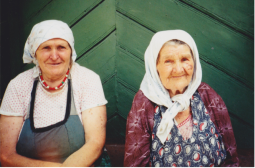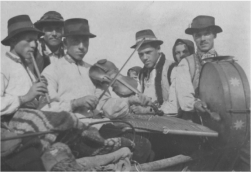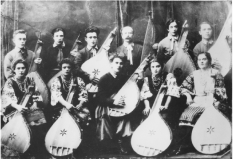Dr. William Noll is academic coordinator and research associate at the Ukrainian Research Institute at Harvard University. He is an ethnomusicologist specializing in folk and village music. Not of Ukrainian descent, he learned Ukrainian at Harvard and has conducted extensive village-based research in Ukraine, Poland, Moldova, and Slovakia. His research interests include the repression of musicians and musicologists in the Soviet period.
He has recently authored several articles on Ukrainian music in ethnographic and general publications appearing in Kiev and Lviv. A recent publication appearing in North America is: “Music Institutions and National Consciousness Among Polish and Ukrainian Peasants” in Ethnomusicology and Modern Music History, S. Blum et al, eds., University of Illinois Press, 1991.
Dr. Noll heads efforts at the Ukrainian Research Institute to study and document changes in the development of Ukrainian village culture, folk music and rural traditions. He instituted a conservation program, affiliated with the Library of Congress in Washington, to preserve turn-of-the-century wax cylinder recordings of music and voice obtained from archives and repositories in Kiev.
The text that follows is part of a conference paper that Dr. Noll delivered in Chicago at the annual meeting of the Society for Ethnomusicology in October.
The events of the last few weeks have altered somewhat the paper that I prepared 10 months ago. As originally written, it was based on research carried out in Ukraine in academic year 1989-1990 on an IREX grant, and discussed the effects of recent reforms in village culture.
However, today the Soviet Union does not exist, while Mikhail Gorbachev and his reforms are largely part of the past. Over the last year I have made four subsequent trips to Ukraine. I just returned one week ago from a two-month research trip in the Ukrainian Carpathians where I taped material for a documentary video on highland village musicians.
Based on this year’s research, a revision of the thesis is in order. I originally stated that the Gorbachev period reforms had little effect on the practice of village music. In 1989 this was still true for most regions. However, by September of 1991 a very different situation existed in all regions, and a virtual culture revolution was beginning in some regions.
I discuss here the context of music practice and its perception among village populations, and point out those practices that were part of the large-scale reforms of the 1930s carried out by the Communist Party. An understanding of the music and culture of Ukraine or any other part of the former Soviet Union is difficult, I think, without a discussion of the proscriptions and prescriptions of the 1920s and especially the 1930s. After this section, I briefly outline some of today’s changes in music practice and perception in the Ukrainian countryside and discuss some of the possibilities that lave recently arisen for researchers of rural music in the lands of the former Soviet Union.


